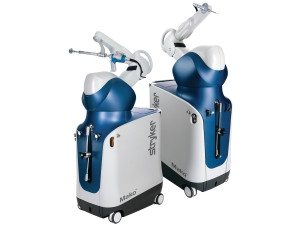
Africa's first-of-its-kind orthopaedic robotic surgery was performed at Busamed Modderfontein Private Hospital, Johannesburg East on Thursday this week.
The surgery was performed using US-based medical technology company Stryker's new Mako Robotic Arm System (Mako).
The Mako technology has already been used to perform over 70 000 surgeries worldwide, and now South Africans and Africans at large can benefit from this orthopaedic robotic technology to deliver improved accuracy to orthopaedic surgeries.
Two surgeries were successfully conducted at the hospital yesterday with the surgeons saying the patients were in good spirits today.
Busamed signed a three-year exclusive deal with Stryke, meaning no other South African hospital will be able to use the machine for the next three years. They did not disclose how much the robot costs.
The private hospital will be the first in the continent to offer Mako robotic-arm assisted partial knee replacement and Mako robotic-arm assisted total hip replacement procedures utilising Stryker's proprietary implants and robotic technology. The Mako Robotic Arm is a surgeon-controlled robotic arm that enables accurate alignment and placement of implants.
"Accuracy is the key factor to the success of any surgery and more specifically for orthopaedic hip and knee joint replacement surgery," says Barbara Moore, chief operating officer for the Busamed Group.
The Mako system enables the surgeon to personalise the surgery to the patient by preparing a patient specific pre-operative CT based surgery plan. The plan is designed to optimise the implant size and placement on the bone to the specific patient anatomy and joint kinematics in order to deliver optimal clinical outcomes. The surgeon can then use the Mako robotic arm during the surgery in order to assure accurate bone preparation and implant placement which was previously unattainable with conventional instrumentation.
"The Mako system features a proprietary patient-specific surgical planning software and surgeon-controlled robotic technology that is designed to deliver such plan. The use of the robotic arm technology allows the surgeon to achieve improved surgical accuracy and clinical outcomes while utilising a least invasive surgical incision," adds Moore.
"Mako is transforming the way joint replacement surgeries are performed," says Paul Richards, business unit director: joint replacement at Stryker SA. "Surgeons are able to personalise each patient's surgical plan pre-operatively, so there is a clear plan for how the surgeon will position the implant before entering the operating room. During surgery, the surgeon can validate that plan and make any necessary adjustments, while the robotic-arm then allows the surgeon to execute that plan with a high level of accuracy and predictability. The combination of these three features of the system has the potential to lead to better outcomes and higher patient satisfaction."
The Mako system in the Busamed Modderfontein Private Hospital is currently supporting both total hip replacement and partial knee resurfacing procedures.
"We are proud to be the first healthcare provider in Africa to provide patients with this innovative technology," says Moore. "17 November 2016, will go down in history books, not just for Busamed Modderfontein Private Hospital, but for the people of Africa too," concludes Moore.
Share